
From "Martial Tai Chi"
Joanna Zorya from the excellent website "Martial Tai Chi" has been in somewhat of a disagreement with Scott and his readers at "Weakness With A Twist".
Joanna's "Martial Tai Chi" site is dedicated to de-bunking the concept of Qi (Chi) as a necessity to the combat aspects of Tai Chi Chuan. Scott Phillips leans more to the Chi side of the argument, and Ol' Dojo Rat here falls somewhere in the middle.
Joanna's site offers a number of very well thought out articles such as "A Practical Guide To Qi", "The Trouble With Qi" and "The Rise And Fall Of A Martial Art". She also has short video clips of fighting techniques That are not only practical but follow all principles of the Internal Arts without emphasising Chi flow and other esoteric methodology. As she states in her writing, as maximum Yin (soft) will turn to Yang (hard), the Tai Chi Chuan community at large is seeking to recover the lost applications of their art, which has been absorbed into the "New Age" movement.
Readers of The Dojo Rat Blog know that I too am extremely frustrated with Tai Chi practitioners that have absolutely no clue with what they are doing in the forms. It drives me crazy that I know twenty-year practitioners that can't even demonstrate push hands let alone self defense techniques. My Tai Chi Chuan class includes both.
But here's where I split with Joanna; I can not completely reject the notion of Chi.
Even if thinking in terms of Chi is just some kind of meta-programming, or self hypnosis, I believe it is a useful process. Much of Chi Kung is visualization, and even professional atheletes have proven how visualization improves performance.
While I realize that the "Chi Freaks" can spin into a zone of impracticality, There are things I have experianced that suggest evidence of the unknown. We all experiance premonitions, hints of psychic flashes, dreams that provide insight. Neither modern science or myself can tell you just how my dowsing rods allow me to find buried water and electrical lines (a subject I may do an entire post on later).
To reject the concept of Chi (Qi) completely is to also reject the essence of the magical and beautifully interconnected world we live in.
Joanna's "Martial Tai Chi" site has some of the most thought provoking articles I have read on this subject, and the thread at Scott's "Weakness With A Twist" is a great discourse between various knowledgeable practitioners. Check 'em out at the links above.
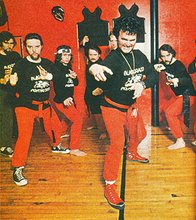




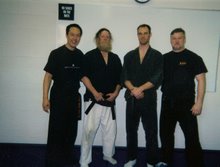
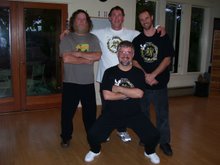

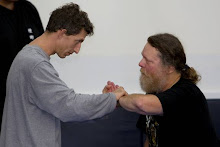
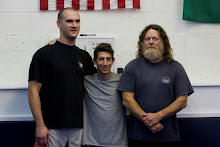

21 comments:
Yeah, I'm skeptical of Ki. However, I must confess that when I break I imagine it surrounding the body part I'm using to break with. (or sending Ki "through" my target)
I also imagine it when I meditate.
I chalk it all up to visualization but still believe that it has a place.
Bob Patterson aka Brad
I believe in qi. Otherwise I wouldn't really be too clever by studying acupuncture... on the other hand, I think too much ridiculous stuff is going on around Taiji and and qi. Like Ratus Localis Via said, 20 year old guys who couldn't fight their way out of a VERY wet paper bag, let alone show some respectable applications for Taiji. Give me Count Dante any day! (since he now seems to have been promoted to some sort of patronhood of this blog :-))
So, I say we sometimes have to put up with the fundamentalists like Joanna. I like pretty much everything she has written, and really enjoy her videos.
Jose'
I ment people who have been practicing Tai Chi for twenty years, not 20-year-olds-- That's even worse!
Ha, ha D.R.
Hi, Dojo Rat
Chi is not really some mystical power that runs through your system nor is it something you can manipulate through practice. Chi is actually energy that flows through out the body. This is why we have problems physically as these meridian lines sometimes, through our thought processes which manifest into physical issues, become blocked. One reason why acupuncture/acupressure works so well to temporarily relieve these issues.
When one so called develops good chi it is simply creating a mind body that leaves all the meridians open and flowing coupled with good physical conditioning along with proper breathing methods creates this illusion of great chi which in reality is optimum body and mind development.
Chi or that energy is always there and always at the same level for each individual. Chi, as the MA likes to think of it, is not really developed yet it is released to flow properly when the person trains to open the mind, body, and spirit. This allows us to have optimum chi flowing in the body.
Look at it as a form of training that encompasses the entire life style of the practitioner. Mental attitude, remaining in zanshin and mushin (the present and now), food consumption, physical and spiritual maintenance and development resulting is a total and whole person. The degree of chi manifestation is determinate upon the practice and training one uses.
Charles
Put up with me? I find me refreshing... and really quite lovable.
Regarding Qi, my first teacher told us that it didn't matter whether we believed in Qi or not, because if it was real, it flowed anyway, as soon as we started to move - we didn't need to do anything special to make it happen. He didn't seem to think it was relevant to our martial training and never mentioned it unless someone asked an occasional question about it. He taught in terms of extension, intention and whole body "connectedness." If you wished, you could add the concepts of rooting and uprooting to this list of things often attributed to qi.
People who are drawn to those martial styles that are commonly referred to as "the internal arts" like to fool themselves. They like to fool themselves that what they are doing is somehow deeper than martial training - somehow more mystical, somehow more spiritual, somehow more meaningful. They like to think that along with inexplicable and effortless martial abilities, they are cultivating in themselves abilities to transcend mundane existence and achieve the superhuman - enlightenment, immortality or exemption from the moral concerns that afflict mere mortals. The more practically inclined might just want to be the toughest (and most enigmatic) guy on the block, but they all dream of power.
It seems that within the Tai Chi mainstream, methods of self deception are entrenched within the training methodology. Some practitioners actually acknowledge this, but see no harm in it. Students are told to visualise themselves expanding to fill the entire cosmos, or to imagine that they have balloons under their armpits, or perhaps that they are moving through water. Perhaps students will be taught to envisage an invisible energy field (qi) that they move around within and around themselves.
When executing a strike or a throw, a student may be told to "sink their qi" in order to develop more grounded power, or to avoid uprooting themselves. Conversely they may be told to "raise the opponent's qi" to uproot or imbalance them - really you are just lifting their centre of balance, thereby making them easier to topple. You might achieve this directly by lifting them up, or by compressing them against the floor to provoke an upwards reaction. A student might be taught to "extend their qi" beyond their actual reach, perhaps through the body of an opponent. In none-Chinese styles I have come across the idea of "placing" which serves a similar purpose when executing throws. By focussing on a specific point on the floor and reaching or pointing towards that spot, we find it easier to place our opponent there.
Tai Chi practitioners may be told to "practice form as if facing an enemy and face an enemy as if practicing form." You can almost ignore the presence of the enemy and move into your desired finish position just as if no one was there.
All these methods actually achieve is a more holistic use of the body by not physically freaking out and using too much force at and near the point of contact. These methods should not be seen as an end in themselves - they are used to counter your body's habit of tensing up under pressure and relying on inefficient localised muscular tension to try to force its way through a problem.
I am not disputing that such methods of kidology might work, but I am saying that it would be far better to simply know the truth and to understand what is going on as accurately as possible. You can think in terms of connectedness, intention, extension, rootedness and uprooting an opponent. Then you can avoid being drawn into a world of spooks, phantoms and exploitation, where anything within the realms of your teacher's imagination becomes possible and you will always be kept in bondage to their whims.
The creator of Yiquan, Wang Xiangzhai was very critical of the energetic / qi methodology and emphasised use of intention alone to achieve the same goals, but sadly, many of his successors have gone back to using the notion of qi in addition to his creative visualisation methods. Perhaps they want the best of both worlds.
Sometimes people wonder why I expend such effort and concern in trying to challenge internal arts mythology. The reason is simple - it is because it is dangerous. It is dangerous because it is not true, and can act as a gateway to harmful spiritual practices. Many people find this hard to grasp. Surely, they argue, we live in a culture where people are free to make their own choices, and people have the right to follow whatever paths they wish. To an extent, if people want to go on fooling themselves, then some might argue that that is acceptable - that is their right. The problem comes when they go beyond that and start to fool others. At that point, they become purveyors of falsehood, and that is the point at which I feel entirely justified to speak out against it.
Without the truth we can get nothing done
- Kongfuzi (Confucius)
Indeed, that is the question. Do we receive the blessings of ambiguity or regret the dangers of vagueness?
Qi, like many words in English, means nothing outside of context and often needs a lot of clarification.
"She smiled at me." What does 'smile' mean here? What does 'at' mean here?
When teaching Taijiquan the expression "sink qi" is often used in descriptions of "an jin" and "lu jin" but to understand these types of jin (power?) one must feel and do a lot more than just sink qi. The expression loosely means, "When you get the posture/movement correct you will feel something moving downward toward your heels inside your body." But when you do 'an' the body moves in an upward direction and when you do 'lu' the body moves in a downward direction.
In all likely hood if someone were striking or throwing you would not instruct them to 'sink qi.' More likely you would instruct them with the command 'sung.' This is a complex term, which sadly is sometimes translated 'sink.' In actuality the word means 'to pull the pin' or 'let your hair down.' Because hair styles were set by law in China, you could tell someone's exact social status by looking at their hair. Thus, by inference, it can mean 'giving up your high status' and thus it is sometimes translated "sink."
Sung actually means something more like 'let go of what you think you should be doing', or 'relax.'
How you get from there to a more powerful strike or a more effective throw is a much longer discussion.
China has a tradition of arguing by using the same term to mean different things. This may be very frustrating to English speakers, but it can still be edifying.
If you've made up your mind that Taijiquan (3 hard words to define!) is only about fighting, than of course you would try to kill ambiguity.
Confucius considered it a whole lifetime project to get your words to match your actions. Such a project requires being comfortable with ambiguity; sticking with the truth of not knowing.
Hi Scott;
I hope it doesn't appear that I hijacked your thread, I just wanted to direct people to your site for the great discussion.
Thanks to everyone for the thoughtful comments!
D.R.
My body doesn't go up when executing an - it goes down. I see no conflict between the concepts of sinking and being sung either - you relax in the direction of gravity. Sink and spread where appropriate, sink and don't spread when not. I think the thing you feel sinking is actually a physical awareness of the fact that your muscles have switched off enough to stop fighting against gravity and you are managing to let your weight sink down through your legs properly, in a kind of "dead weight" kind of a way. (Trying to move you at this point should feel a bit like trying to lift a very relaxed dog - a lot harder than seems appropriate for the perceived mass.) While maintaining the correct vertical alignments, everything tries to reach the lowest point - just like water.
Scott said "Qi, like many words in English, means nothing outside of context and often needs a lot of clarification."
I'd have thought that the lack of precision inherent within such an unspecific term as "qi" would be all the more reason to abandon it in favour of more precise and readily communicable terms.
Yes, I can invent theory and new narrower vocabulary to explain the various Qi transmissions I teach. The problem is that theory is vulneralable to what Richard Rorty called the 'Narsissism of Ideas.' Chances are high that your latest explaination using anatomy or physiology to explain a given feeling or function will be bogus!
By leaving it open, by calling it qi, you also leave intact the process of discovery and the confidence that comes from humility.
Thank You Very much Scott, D.R.
Just excuses - a teacher has a responsibility to convey ideas accurately and clearly. By resisting this and by insisting that there is always some kind of subjective / mystical / experiential aspect, you enforce keeping an art in the dark ages, where most of its practitioners and teachers don't really know whether or not they are doing it right or doing it the same as anyone else. It is impossible to have a meaningful dialogue about the relative merits of different approaches when no one is prepared to have their art analysed in anything approaching a coherent way.
I recently read a thread that discussed "pulsing" from either leg, as appropriate to a given situation. In my opinion this can only be referring to use of muscles being used to push against the ground. If the teacher doesn't know that he is doing this and doesn't understand when to "pulse" from which leg, then he doesn't have a clear enough understanding of his art, and is hiding behind enigma, which everyone else in the Tai Chi community actually laps up instead of being skeptical.
Tai Chi folk are more enamoured of mystery than martial arts. It serves everyone to keep things vague and wooly, because then any gaps in their knowledge will not be exposed. Optimal movement is optimal movement - there can only be one way and that way should be open to everyone. As it stands, the art is fragmented into a multitude of vastly different stylistic approaches - what a wasted opportunity.
The bottom line is that we are 100% Qi-Free because Qigong is a deification of physical sensation - it is an act of self-love.
Here is the tradition that spawned it:
http://visionpressfilms.com/visionpf.htm
http://www.daoistmagic.com/info.php?i=2134
Joanna;
You might be interested in a post I wrote in June: When does a class become a cult?
It's in my June archives or here:
http://dojorat.blogspot.com/2007/06/when-does-class-become-cult.html
It deals with Jerry Allen Johnson and his Daoist magic cult
D.R.
Thanks, D.R
I just wanted to alert you to the fact that Scott Phillips over on his "Weakness with a Twist" blog has edited one of my posts on the thread "A Parade in India 15 Miles Long" adding a paragraph of his own and thereby completely changing the spirit of what I was saying. He also edited out a comment by another person along with my reply to it. I thought you'd be interested in case he did it to anyone who reads this blog. Of all the sneaky, dishonourable tricks I've come across on forums and blogs, this was the lowest.
Should anyone be interested in the ongoing saga:
http://reelingsilk.wordpress.com/2007/08/17/how-low-can-you-sink/
birkin bag
off white
golden goose outlet
off white clothing
birkin bag
offwhite
golden goose sneakers
yeezy
kyrie 6 shoes
yeezy shoes
replica bags in delhi replica bags manila replica bags hong kong
d4o36k8a78 c7x49s9d10 y1s19g1k26 o1g60u2m72 j3j19n0z61 v5t54x0s02
golden goose outlet
kyrie shoes
supreme new york
nba star shoes
golden goose
Post a Comment